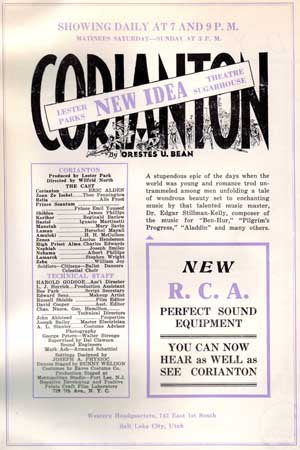-
•
•
14 responses
When my neighbor four-doors-down called last night and asked if I could take dinner to my neighbor three-doors-down, I said yes. I’m a Mormon mom: dinner for a single, middle-aged man is no problem. It was the circumstances that made me pause. Read More
-
•
•
Michelle Glauser is a young Mormon American woman living in Germany. I’ve long read her blog, Circles and Dots and Other Distractions, which is a riot of activity — she may be based in Leipzig, but she’s just as apt to be blogging about her trip through Turkey, or Switzerland, or Poland, as she is to be describing life as an ex-pat in a German university. Her recent master’s thesis is a serious study of the surprising meanings of blogging, especially mommy blogging. Read More
-
•
•
92 responses
President Uchtdorf conducted the Sunday afternoon session, featuring talks by Elder Holland, Elder Cook, Elder Neilson, Elder Renlund, Elder Ringwood, Elder Sitati, and Elder Christofferson, followed by closing remarks from President Monson. Direct quotations (based on my notes) are given in quotes; phrases without quotes are my summary of the remarks given. Read More
-
•
•
President Monson conducted the Sunday morning session, featuring talks by President Eyring, Elder Perry, Elder Burton, Sister Dibb, Elder Nelson, and President Monson. Direct quotations (based on our notes) are given in quotes; phrases without quotes are our summary of the remarks given. Read More
-
•
•
14 responses
My son was none-too-thrilled to realize last night that by next General Conference he will be twelve and *get* to go to a two-hour meeting with his dad. We thought that reviving my husband’s tradition Read More
-
•
•
13 responses
President Uchtdorf conducted the Priesthood session, featuring talks by Elder Ballard, Elder Gonzalez, Elder Choi, Elder Uchtdorf, Elder Eyring and President Monson. Direct quotations (based on my notes) are given in quotes; phrases without quotes are my summary of the remarks given. Read More
-
•
•
7 responses
President Eyring conducted the Saturday afternoon session, featuring talks by Elder Oaks, Elder Hales, Elder Zeballos, Elder Callister, Elder Watson, Elder Anderson, and President Packer. Direct quotations (based on my notes) are given in quotes; phrases without quotes are my summary of the remarks given. Read More
-
•
•
16 responses
President Eyring conducted the Saturday morning session, which featured brief remarks from President Monson and talks from Elder Scott, Sister Matsumori, Elder Clayton, Brother Osguthorpe, Elder Bednar, and President Uchtdorf. Direct quotations (based on my notes) are given in quotes; phrases without quotes are my summary of the remarks. Read More
-
•
•
One response
Last month we posted Royal Skousen’s discussion of his work on recovering the earliest version of the Book of Mormon, along with some updates. Unfortunately, that post garnered some annoying formatting problems — mostly due to the new format T&S adopted this year. We’re happy to now present to you mark III of Royal Skousen’s 12 questions interview. Royal Skousen’s book, The Book of Mormon: The Earliest Text, was published last month by Yale University Press and yes, you can order it at Amazon. Read More
-
•
•
25 responses
Yesterday, a Mormon Times article began with this opener: “For Finnish music star Mervi Hiltunen-Multamäki, trading in exotic concert locales, a prime-time TV show and platinum records for diapers, dishes and dusting was an easy decision. Maybe that’s because following the prophet has never been hard for her.” Read More
-
•
•
10 responses
After a bit of work and discussion, a small group I’m working with has issued a call for papers for what may be the first academic conference on Mormonism not held principally in English. The conference will be held in São Paulo, Brazil this coming January. Read More
-
•
•
4 responses
If we accept, at least for the moment, that 1 Nephi has a textual history, that it drew on older sources or underwent expansion at various times, then we might wonder what could be considered the oldest layer of the text Read More
-
•
•
92 responses
Someone feels the need to tattle on us to the bishop every so often. Read More
-
•
•
27 responses
A dear friend sent me an email: “Whassup with Isaiah 6:10?” Read More
-
•
•
12 responses
A lot happened in Nauvoo that doesn’t get covered in Sunday School or the one-volume treatments of LDS history. But Glen Leonard’s Nauvoo: A Place of Peace, a People of Promise tells the story in detail from start to finish. Read More
-
•
•
One response
A new issue of The Mormon Review is available, with a review of Alfred Hitchcock’s movie “Vertigo” by Joseph M. Spencer. The article is available at: Joseph M. Spencer, “The Romance of Materialism: Notes on Hitchcock’s Vertigo,” The Mormon Review, vol.1 no. 6 [HTML] [PDF] For more information about MR, please take a look at the prospectus by our editor-in-chief Richard Bushman (“Out of the Best Books: Introducing The Mormon Review,” The Mormon Review, vol.1 no.1 [HTML][PDF]). In addition to our website, you can have The Mormon Review delivered to your inbox. Finally, if you have recently read a book,… Read More
-
•
•
10 responses
I’m posting this at Times and Seasons as follow-up to a three-part series I wrote here a couple years back (see here, here and here). I’ve cross-posted it over at A Motley Vision’s companion blog Wilderness Interface Zone. September 17th marked the two-year anniversary of the closing of Crossfire Canyon (real name: Recapture Canyon) to off-highway vehicular (OHV) travel. Since then, the canyon has become an even more volatile epicenter of rhetorical and legal power struggles over land use policy. Private citizens, environmental and off-road advocacy groups, and the federal government have all entered dogs in the fight. Read More
-
•
•
46 responses
“We can’t get in,” a young man argued. “The Masons are like a super-secret society!” Read More
-
•
•
30 responses
My basic problem with Blake Ostler’s expansion theory is that it approaches via intellectual history what is at heart a problem in textual history Read More
-
•
•
12 responses
The Bible, as we have received it, sets out the drama of salvation with its wrenching fall and crucifixion, but joyous resurrection and exaltation. Though its compilation is in many ways ad hoc, there is a satisfyingly comedic structure to the whole. As Terryl Givens puts it in his The Book of Mormon: A Very Short Introduction, just out from Oxford University Press, “There is a neat symmetry . . . Primordial creation is balanced by apocalypse and heavenly postscript . . . All tears are wiped away, and the primal fall and alienation are remedied by reunion under the… Read More
-
•
•
50 responses

They immersed themselves in the characters and, by so doing, opened the door to deeply significant conversations between the cast, their parents, and the community. Artistic explorations have the power to touch us deeply, in ways that detached discussion about concepts cannot. Read More
-
•
•
3 responses
This new volume is the second overall in the Joseph Smith Papers, but is the first of the Revelations and Translation series which will provide transcripts of many of the earliest manuscripts of Joseph Smith’s written revelations and translations… Read More
-
•
•
14 responses
A new issue of The Mormon Review is available, with a review of Dan Brown’s new novel The Lost Symbol by Scott Holley. The article is available at: Scott Holley, “Exaltation and The Lost Symbol,” The Mormon Review, vol.1 no. 5 [HTML] [PDF] For more information about MR, please take a look at the prospectus by our editor-in-chief Richard Bushman (“Out of the Best Books: Introducing The Mormon Review,” The Mormon Review, vol.1 no.1 [HTML][PDF]). In addition to our website, you can have The Mormon Review delivered to your inbox. Finally, if you have recently read a book, seen a… Read More
-
•
•
13 responses

Short review of Corianton: By today’s standards, it wasn’t a very good movie. But by 1931 standards? Well, it wasn’t a very good movie. Read More
-
•
•
24 responses
My copy of the new LDS edition of the Bible in Spanish arrived yesterday, one of the 750,000 copies printed recently (according to a contact I have in the Church department that prints these materials). So I thought I would pass on my impressions. Read More
-
•
•
17 responses
Want to really knock the socks off of your youth with a fun and very different object lesson? Then try out miracle berries. Read More
-
•
•
16 responses
I went on one of the best dates I’ve been on in some time tonight – my daughter and I went to BYU’s World of Dance. Read More
-
•
•
28 responses
Yesterday in Elders Quorum I taught Lesson 40: “How Glorious are Faithful, Just and True Friends.” It was a lot of fun — it’s a great set of discussion materials. Today, I read a fascinating article in the New York Times about the science of human friendship and connection. I love the idea of Zion as a community. Most of our most rewarding experiences come in the context of interaction with other people. And when the church community is functioning right, it can not only provide a setting but also facilitate the building of those kinds of bonds of friendship… Read More
-
•
•
107 responses
A new issue of The Mormon Review is available, with an essay on Goethe’s Faust by Terryl Givens. The article is available at: Terryl Givens, “The Redemption of Eve: Joseph Smith and Goethe’s Faust,” The Mormon Review, vol.1 no. 4 [HTML] [PDF] For more information about MR, please take a look at the prospectus by our editor-in-chief Richard Bushman (“Out of the Best Books: Introducing The Mormon Review,” The Mormon Review, vol.1 no.1 [HTML][PDF]). In addition to our website, you can have The Mormon Review delivered to your inbox. Finally, if you have recently read a book, seen a movie,… Read More
-
•
•
46 responses
“So if anyone tells you, ‘There he is, out in the desert,’ do not go out; … do not believe it” (NIV Matt. 24:26). Read More
